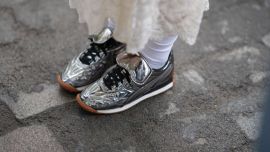A polarised Senate will decide Tuesday whether to legalise abortion in Argentina in a vote experts say could go either way.
The bill proposed by President Alberto Fernández already passed the Chamber of Deputies on December 11, despite fierce opposition from the Catholic Church and evangelical Christians.
"I'm Catholic but I have to legislate for everyone. Every year around 38,000 women are taken to hospital due to (clandestine) abortions and since the restoration of democracy [in 1983] more than 3,000 have died of this," said Fernández.
The government says there are between 370,000 and 520,000 illegal abortions a year in Argentina, a country of 44 million.
A similar bill two years ago also passed the lower house but then floundered in the Senate.
This bill aims to legalise voluntary abortions at up to 14 weeks. Terminations are currently only allowed in two cases: rape and danger to the mother's life.
Tuesday's debate will begin at 4pm local time, but the vote is not expected until sometime during the night.
Despite measures to prevent the spread of the coronavirus pandemic, both pro- and anti-abortion supporters plan to demonstrate in front of Congress.
Religious leaders from the Catholic Church and Christian Alliance of Evangelical Churches have called for their supporters "to unite to implore for respect and care for unborn life."
"God is the one who decides the time of birth and the time of death, and prohibits humanity from getting involved in this territory," the Christian leaders said.
The vote is expected to be razor-thin, despite the governing Frente de Todos alliance led by Fernández making up 41 of the 72 Senate seats.
Not everyone in that coalition supports the bill, while the right-wing Juntos por el Cambio opposition front is mostly opposed to it.
"In the Senate there are many votes that haven't yet been decided. They will only be known at the end," said Nancy González, a senator with the governing coalition.
The result could be affected by the absence of two anti-abortion senators.
One will be missing after being accused of sexual assault, while former president Carlos Menem, who is 90, is currently in hospital receiving treatment for heart and kidney pains.
Should the vote result in a tie, the deciding lot would fall to Senate President Cristina Fernández de Kirchner, the country's ex-president and current vice-president who two years ago changed her stance from anti-abortion to pro-choice.
"This is the moment to finally approve the [abortion] law. Enough of the strategy of criminalization, stigmatisation and curtailment of freedoms historically inflicted on pregnant women," Fabiola Heredia, the director of the Anthropological Museum at the University of Córdoba, wrote on social media.
Pro-choice activists have campaigned for years to change the abortion laws that date from 1921, adopting a green scarf as their symbol.
They will be out in force on Tuesday, standing face-to-face with anti-abortion supporters brandishing light blue scarves.
"We're going to be in the streets because we're going to have a party. But the Senate is impervious to the street, the decision will be made on the other side" of the walls, said María Florencia Alcaraz, who has written a book about the fight to legalise abortion in Argentina.
Progress has always been slow in Argentina: divorce was legalised only in 1987, sex education introduced in 2006, gay marriage approved in 2010 and a gender identity law passed in 2012.
The Catholic Church is fighting this issue all the way. On Saturday, Archbishop Oscar Ojea prayed to the Virgin Mary at the Luján Basilica in Buenos Aires for help in preventing the law from passing.
"Blessed Virgin, pause your gaze on our legislators who must decide on an extremely sensitive issue, so that they may reflect with their minds and hearts," said Ojea at the Mass.
In Latin America, abortion is only legal in Cuba, Uruguay and Guyana, as well as Mexico City. In El Salvador, Honduras and Nicaragua, it is totally banned, and women can be sentenced to jail even for having a miscarriage.
related news
by Daniel Merolla, AFP


























Comments